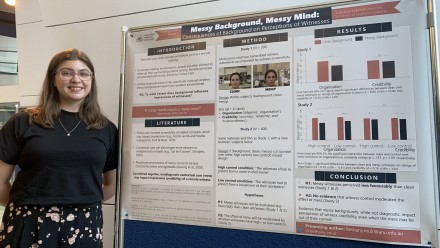Prof Kate Reynolds

Contacts
Kate Reynolds is Professor of Psychology at the Australian National University (ANU). Her research addresses group processes (leadership, influence, norms) and intergroup relations (prejudice, discrimination, cohesion, social change), and is informed by the social identity perspective (e.g., Turner & Reynolds, 2012). The broad research questions that frame her work concern the impact of groups and group norms on individual’s attitudes, well-being and behaviour. Groups can be small or large and refer to when people are connected to one another by a shared characteristic, interest or purpose (ethnic, religious, political, national, attitudinal, work-based).
Kate has received funding from the Australian Research Council (Discovery & Linkage) and Federal and State Governments and her research has appeared in top scientific journals and received media attention. She has published over 100 journal articles and book chapters and co-edited book volumes, including The Psychology of Change: Life contexts, experiences and identities (2015) and Understanding Prejudice, Racism and Social Conflict (2001). She has served on several executive committees of professional societies, editorial boards and as Associate Editor of Personality and Social Psychology Bulletin and Political Psychology. Currently, she is President of the Society of Australasian Social Psychologists (2017-2019) and immediate past-President of the International Society of Political Psychology. At ANU she has been Associate Director of the Research School of Psychology (2014-2017) and a member of other School, College and University committees (Human Ethics, Research, Equity & Diversity, ANU Academic Board 2018-2020, ANU Council Jan 2019-Sep 2021).
Kate is committed to sharing the insights from social psychology and behavioural science more broadly, so they are accessible and useful.
Research interests
Current Research:
School climate and school identification project: Schools are an important environment to build positive futures for young people. In collaboration with ACT Education we have been studying ACT schools for the last 10 years. We have found using a longitudinal design that student perceptions of positive school climate are significantly related to the school outcomes of academic achievement, well-being, and bullying/aggression. Furthermore, positive changes in school climate perceptions and school identification over time (three years) are related to improved student engagement and decreased bullying. These results indicate that through strengthening school climate and school identification (psychological connection and belonging to the school) and certain group (school) norms it is possible to change behaviour. New avenues of research are better understanding how schools build connected environments to improve learning and youth well-being.
Here are some quotes that summarise the research project:
“We are exploring how to create brighter futures through better understanding the role of school connectedness - identification, belonging - on academic achievement, bullying and well-being. Partnering with ACT Education Directorate, the RSP research team has been studying ACT schools for the past 10 years and the research is having an impact nationally and internationally".
“In this project we found positive changes in school climate perceptions and school identification over time were related to improved student engagement and decreased bullying. These results indicate that psychological connection and belonging to the school leads to better outcomes".
“The research is part of a larger effort to develop new more effective models of behaviour change with a particular focus on human connections and social norms - what others do.”
Strengthening social cohesion project: Governments around the world are seeking to build social cohesion, tolerance and reduce discrimination especially as communities become more ethnically diverse. Often NGOs through government grants lead such initiatives. We have found using a controlled design that community-led programs can be effective in reducing prejudice and youth alienation and increasing willingness to stand up against instances of racism. Furthermore, it is through the program norms related to acceptance of diversity and identification with the program and its leadership that explains these changes in attitudes and behaviour.
These ideas will now be incorporated within a larger inter-disciplinary ANU grand challenges project on social cohesion, diversity and integration (2019-2021). The aim is to better understand social cohesion and how to strengthen it though working closely with public policy, social and business enterprises, local government and community organisations.
Research Funding (total over 4 million; >200,000 p.a. since 1998)
Recent Grants
2019-2021(A$480,000) School identification, school climate and school outcomes: Evidence from ACT Schools Awarded by ACT Education Directorate to Katherine J. Reynolds, Kathleen Klik & Emina Subasic.
2016-2018 (A$207,000) School identification, school climate and school outcomes: Evidence from ACT Schools Awarded by ACT Education Directorate to Katherine J. Reynolds, Kathleen Klik & Emina Subasic.
2012-2015 (A$630,000) School identification, school climate and school outcomes: Evidence from ACT Schools Awarded by ACT Education Directorate to Katherine J. Reynolds & Emina Subasic.
2012-2014 (A$325,000 cash & A$525,000 in-kind) Building successful diverse communities: What works and why? Awarded by the ARC (Linkage) to Katherine Reynolds, Emina Subasic, Miles Hewstone (University of Oxford, UK), Linda Tropp (University of Massachusetts, USA), Anita Davis (DIAC) and James Fox (DIAC) in partnership with the Department of Immigration and Citizenship.
2010-2013 (A$460,000) Leadership, social identity and the dynamics of influence in intergroup relations: A new understanding of social continuity and change. Awarded by the ARC (Discovery) to Emina Subasic, Katherine Reynolds, Paul ‘t Hart, Alex Haslam (University of Exeter, UK) & Steve Reicher (St Andrews University).
Projects
Recent Publications (Selected) (>100 publications; one-third with HDRs/ECRs; >4 p.a.; >7000 citations; h=42, i-10=79).
Chapters
Reynolds, K. J., Branscombe, N., Subasic, E., & Willis, L. (2019). Social behaviour change: The potential of social identity processes and ingroup norms. In M. Hagger, L. Cameron, K. Hamilton, N. Hankonen & T. Lintunen(Ed). Handbook of Behavior Change. Cambridge University Press.
Reynolds, K.J., Subasic, E., Bromhead, D., & Lee, E. (2017). The school as a group system: School climate, school identity and school outcomes. In K. Mavor, M. J. Platow & B. Bizumic (Eds). The self, social identity and education. London, UK: Psychology Press.
Reynolds, K.J., Subasic, E., Batalha, L. & Jones, B. (2017). From prejudice to social change: A social identity perspective. In C. Sibley, & F. Barlow (Eds). Cambridge Handbook of the Psychology of Prejudice (pp. 337-356). Cambridge, UK: Cambridge University Press.
Subasic, E., Reynolds, K. J. & Mohamed, M. S. (2015) Changing identities to change society: Leadership as a contest for influence and collective mobilization. In K. J. Reynolds & N. Branscombe, (Eds.) (2015) The Psychology of Change: Life Contexts, Experiences, and Identities (pp. 246-263).New York & London: Psychology Press.
Reynolds, K. J., Haslam, S. A., & Turner, J. C. (2012) Social identity, prejudice and social change: Beyond the Allportian problematic. In J. Dixon & M Levin (Eds), Beyond prejudice: Extending the social psychology of conflict, inequality and social change (pp. 48-69). Cambridge: Cambridge University Press.
Reynolds, K. J., Subasic, E. & Jones, B. (2012). Authority, leadership and social norms. Cape York Welfare Reform Evaluation. (Chapter 5, pp.145-163). Department of Family, Housing, Community Services and Indigenous Affairs (ISBN 978-1-921975-80-6).
Journal articles (Recent)
Reynolds, K. J. (2019). Social norms and how they impact behaviour. Nature Human Behaviour, 3, 14–15
An overview of different explanations of how social norms impact on behaviour (Views & Comments).
Ferguson, M. A., Branscombe, N. R., & Reynolds, K. J. (2019) Social psychological research on prejudice as collective action supporting emergent ingroup members. British Journal of Social Psychology, 58, 1-32. (Landmark article)
The aim of a landmark article is to showcase larger trends in the discipline and to stimulate discussion and debate. This article raises questions about prejudice and why researchers study some groups and not others and how the target of enquiry changes.
Klik, K. A, Williams, S. L., & Reynolds, K. J. (2019) Toward the Understanding of Mental Illness Stigma and Help-Seeking: A Social Identity Perspective. Social Science & Medicine, 222, 35-48.
The majority of people with mental health issues are unlikely to seek help. This article aims to identify new factors that lead to help-seeking. It investigates aspects of the social identity perspective, namely group social identification and perceptions about the group. These factors emerge as being important and offer new pathways to improve mental health outcomes.
Reynolds, K. J. (2018) Looking back, looking forward: ISPP at 40 and future directions for political psychology, Political Psychology, 39, 745-754.
This article is based on the Presidential Address (2017) of the International Society of Political Psychology (2016-2017) in published form and considers future directions for the field.
Tong, L., Reynolds, K., Lee, E. & Liu, Y. (2018) School Relational Climate, Social Identity, and Student Well‐Being: New Evidence from China on Student Depression and Stress Levels, School Mental Health.
Honours student research (2016). Using access to a China-based data set this article explores a new model to better understand student stress and depression. It integrates core aspects of school relational climate (teacher and peer relationships) and school identification (connectedness, belonging) in explaining student negative well-being (depression and stress) in a non-Western cultural context.
Turner, I., Reynolds, K. J., Lee, E., Subasic, E., & Bromhead, D. (2018). Understanding Aggression and Victimization: Negative Binomial Modelling With Supportive School Climate, Mental Health, and Social Identity Mediation. Translational Issues in Psychological Science, 4, 380-402.
Each issue of TPS concentrates on a single important, timely, and/or potentially controversial theme in translational science that is of broad interest to scientists, practitioners, and the general public.
Subasic, E., Hardacre, S., Elton, B., Branscombe, N., Ryan, M., & Reynolds, K. J. (2018) “We for She”: Mobilising Men and Women to Act in Solidarity for Gender Equality. Group Processes & Intergroup Relations, 21, 707-724.
This article offers a new analysis of mobilising men and women to support gender equality and its insights suggest there are benefits to moving beyond initiatives such as “males champions for change”. The paper has been included in the Harvard University based Women and Public Policy Program's Gender Action Portal (GAP: gap.hks.harvard.edu) which aims to have an impact on public policy and organisational practices.
McKenna S., Lee, E. Klik, K. A., Markus A, Hewstone M, & Reynolds K. J. (2018) Are diverse societies less cohesive? Testing contact and mediated contact theories. PLoS ONE, 13(3)
Honours student research (2015). This article is a systematic analysis of available Australian data (Scanlon mapping social cohesion survey) with respect to Putnam’s argument that community demographic diversity is related to less social cohesion. The current findings extend Putnam’s analysis to consider the impact of positive contact between people from different ethnic groups.
Mahfud, Y., Badea, C., Verkuyten, M., & Reynolds, K. J. (2018). Multiculturalism and attitudes toward immigrants: The impact of perceived cultural distance. Journal of Cross-Cultural Psychology, 49, 945-958.
This article examines the conditions under which people will be more likely to support multiculturalism. Using data from France and the Netherlands, results show that explaining why multiculturalism is important to society (abstract construal) rather than how the goals of multiculturalism can be established (concrete construal) leads to more posiitve attitudes amongst those who are most prejudiced (high cultural distance). These findings are revelant to those seeking to promote support for multiculturalism.
Teaching (>20 years teaching experience from 1st year to PhD)
Current Courses
PSYC1004 - Introduction to Psychology (Social Psychology)
PSYC3028 - Industrial and Organisational Psychology
International (South West University, Chongqing, China) – Social Psychology of Organisations, Introduction to Social Psychology.
Current HDR students
Mia Cotan Utomo
Fiona Dunne
Lisa MacNaughton
Emma Smadbeck
Loren Willis
Haochen Zhou










